|
|
|
|
|
|
|
|
|
|
|
|
|
 |
 |
 |
 |
|
 |
 |
|
|
 |
 |
 |
 |
|
 |
 |
 |
 |
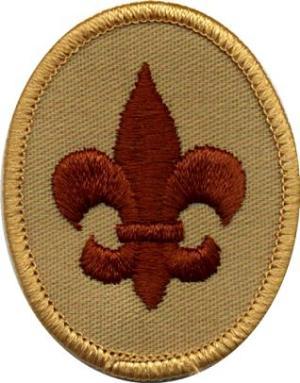
|
 |
I pledge allegiance to the flag
of the United States of America
and to the republic for which it stands,
one nation under God,
indivisible, with liberty and justice for all. |
Scout Sign
 |
The Scout sign shows you are a Scout. Give it
each time you recite the Scout Oath and Law. When a Scout or Scouter
raises the Scout sign, all Scouts should make the sign, too, and come to
silent attention. |
Scout Salute
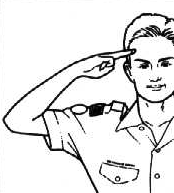 |
The Scout salute shows respect. Use it to salute
the flag of the United States of America. You may also salute a Scout
leader or another Scout.
Give the Scout salute by forming the Scout sign with your
right hand and then bringing that hand upward until your forefinger
touches the brim of your hat or the arch of your right eyebrow. The palm
of your hand should not show.
|
Scout Handshake
 |
The Scout handshake is made with the hand
nearest the heart and is offered as a token of friendship. Extend your
left hand to another Scout and firmly grasp his left hand.
Only use this handshake when both people are in uniform. |
Square Knot
 |
The square knot is also know as the joining knot
because it can join two ropes and because it is the first knot Scouts
learn when they join the BSA. It has many uses:from securing bundles,
packages, and the sails of ships to tying the ends of bandages.
To tie a square knot, hold one rope end in each hand.
Pass the right end over and under the rope in your left hand and pull it
snug. Next, pass the rope now in your left hand over and under the one
now in your right, and pull it snug.
Remember, right over left, left over right.
|
| Scout Oath or Promise |
On my honor I will do my best
To do my duty to God and my country and to obey the Scout Law;
To help other people at all times;
To keep myself physically strong, mentally awake, and morally straight. |
| Scout Law |
A Scout is:
Trustworthy, Loyal, Helpful
Friendly, Courteous, Kind
Obedient, Cheerful, Thrifty
Brave, Clean, and Reverent |
| Scout Motto |
Be Prepared |
| Scout Slogan |
Do a Good Turn Daily |
| Outdoor Code |
As an American, I will do my best to:
be CLEAN in my outdoor manners,
be CAREFUL with fire,
be CONSIDERATE in the outdoors, and
be CONSERVATION-minded. |
| Describe the Scout Badge |
 |
Shape
 |
The three-point design of the top half is
like the north point of an old sailor's compass. This shows that a Scout
is able to point the right way in life as truly as the compass points
it in the field. |
Three Points
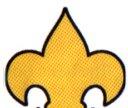 |
The three points of the trefoil are like the
three fingers used in the Scout sign. They stand for the three parts of
the Scout Oath: duty to God & country; duty to others; duty to
yourself. |
Eagle and Shield
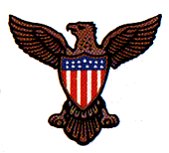 |
The eagle and shield, national emblem of the US, stand for freedom and a Scouter's readiness to defend that freedom. |
Two Stars
 |
The two stars stand for truth and knowledge of the Scouting movement. They guide you by night and suggest a Scout's outdoor life |
Scroll
 |
The scroll is turned up at the ends to
remind us of the corners of a Scout's mouth raised in a smile as he does
his duty. The Scout motto is printed across the scroll. |
Knot
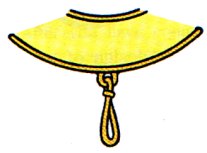 |
The knot attached to the bottom of the scroll represents the Scout slogan, Do a Good Turn Daily. Learn to Tie the Knot |
|
|
|
 |
 |
|
 |
 |
 |
 |
 |
 |
 |
 |
|
 |
 |
 |
 |
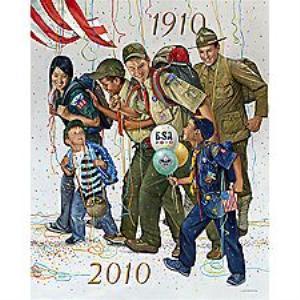
|
WHAT should you look for when you visit a troop?
WHAT are some signs of a "good" unit?
Keep these questions in mind...
- How is the attendance? (low enrollment and/or attendance may indicate a troubled program.)
- Were the boys AND leaders in the proper uniform? (RUN from any troop that allows the "bluejean brigade",
where they are only in uniform from the waist up. If they don't
promote the basic uniform, rest assured that OTHER THINGS are missing
too.)
- Are boys advancing at an
individualized rate? Is there a mix of ranks among the Scouts, even in
the same patrols? (Right answer is "yes")
- How many EAGLES did they have
last year? (BEWARE of "Eagle Farms". On average, only 2 per 100 boys
in Scouting make it to Eagle. Rates higher than average demand scrutiny
as they may be too lax about advancement requirements, or may indicate
an "adult prepared" agenda. "EAGLE" is earned by the BOYS making the
effort to achieve on their own initiatives, not by being "spoon fed" an
agenda of merit badge coursework over a pre-defined schedule.)
- Were YOU welcomed? Did they make you feel genuinely welcomed and wanted?
- WHO is TEACHING? Boys, or
adults? (With the exception of "advanced" skill instruction, boys
should be running the meeting, not adults.)
- Are they having FUN? Do boys look interested, or bored?
- Are there boys of various
ages? (Big gaps in enrollment may indicate periods of a problem
program or "issues" with the adult leadership.)
- How long has the Scoutmaster
been the Scoutmaster? (A "new guy" may be lacking experience, and "old
timers" generally lack "updated program" changes.)
- Is there room for you as a leader or on the Troop Committee? If you're told, "we're all full", that is NOT a good sign!
- Are the boys well behaved? Do
they respond to the "Scout Sign" or was someone screaming "SIGNS
UP!!!"? Any screaming is a warning sign.
- Ask what trips they've had,
and what they have planned. Do they do the same thing every year, or
are they always trying something new and exciting?
- WATCH YOUR SON! Did he blend in? Did the boys make efforts to include him?
- Watch for different "stages"
of the Troop meeting. There should be distinct periods of Skill
Instruction, Patrol time, Inter-patrol Activity, and some formal opening
and closing ceremonies.
- Finally, what are the
facilities like? Is there adequate meeting space.. storage
space...space to "do things"? (OK, we are a little biased since we have
our own gun ranges, fish pond, archery range, stream, field, etc....)
"One last thing All Boy
Scout Troops are not the same, you may come into a new Troop that has
just got started or a older Troop that is rebuilding, Not every Troop
will be 100% in what was aforementioned". These are some things to look
at.
|
|
 |
 |
|
 |
 |
 |
 |
|
|
|
|
|
|
|
|
|
 |
 |
|
|
|
|
 |
 |
|
 |
 |
 |
 |
|
|
|
|
|
|
|
|
|